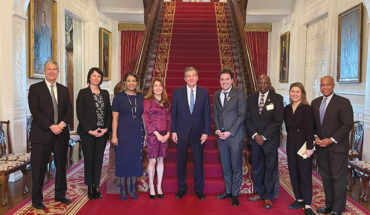by Liza Roberts
photographs by Tim Lytvinenko
When Gaurav Patel left the 200-person town of Zervavra, in the Northern Indian state of Gujarat, for Morehead City, N.C., it was 1993. He was 10, and spoke no English. Twenty-one years later, Patel, who today goes by “G,” is an American success story and a charismatic human face of Raleigh’s entrepreneurial spirit and booming possibilities.
Patel’s Eschelon Experiences owns five thriving and very different Raleigh eateries and plans to launch at least a dozen more in the next six years. All are profitable, busy, and command top rankings on sites like Yelp and Open Table. Restaurants may be just the beginning. The marketing and real estate skills that have helped fuel his success – the restaurant empire is already worth millions – have Patel considering Eschelon subsidiaries devoted to these industries, too. He’s only 30, so he’s got time.
Right now, Patel owns the popular North Hills sushi restaurant Mura; clubby Cameron Village Bar & Grill; giant downtown Asian restaurant/nightclub Zinda; and The Oxford, a downtown British gastropub. Until recently, he also owned downtown’s Sono Sushi. Under construction are two more: Faire, a midcentury-modern steak and seafood spot in Cameron Village slated to open within months, and a still-unnamed new spot in Durham. There’s another in the works downtown for 2015. He employs just under 200 people.
“G has brought hundreds of jobs to downtown, and a sense of style and fashion,” says David Diaz, president and CEO of the Downtown Raleigh Alliance. “When I look at G, I see someone who has big-city panache. Raleigh is becoming a big city. A young person like G is really shaping the way the city is growing.”
Handsome at just over 6 feet 3, and in one of his typical three-piece suits, Patel has a sophisticated, old-fashioned glamour, very different from that of many of his successful “Millennial” peers. Unlike them, Patel looks like what he is: a mogul-in-the-making.
In his hometown of Zervavra, “everybody knew everybody,” Patel says. The town sustained itself with agriculture and livestock. In school, he was given a plot of land and some spinach seeds and told to turn that small crop into funds for school supplies. It was his first business venture.
In Morehead City, Patel knew no one but the eleven members of his extended family, many of whom lived together in the hotel they ran.
Patel learned English, he learned the hospitality business, and he learned that he had a head for it. As soon as he got to N.C. State and was on his own, “I knew I wanted to do some kind of business,” he says, “I didn’t know what.” He didn’t yet realize just how much those early years had taught him. A focus on details – which today range from the pennies per copy he’s paying for his menus to the 45-degree angle of a row of Mura bar stools – started young, when he had to make beds in the family hotel just-so, line up the glasses on the bathroom sink, and keep it all dust-free.

G Patel stands at the center of his extended family at the hotel they owned in Morehead City. The photo was taken shortly after they immigrated from India in late 1993. His grandparents stand on either end.
Like many a successful entrepreneur, when Patel decided to start his own business, he followed his passion: People and parties. “I loved socializing, talking to people, getting to know them. Why not make money at it?” As an 18-year-old undergraduate in N.C. State’s College of Management, he got his start, seeing opportunity where others didn’t.
He thought he could fill Chapel Hill’s NV nightclub with friends from the Triangle Indian community on a Thursday night, when it usually quiet. He promised the club it would earn at least $1,500 at the bar if he could charge for admission. He paid $109 for 5,000 fliers and borrowed a copier to make 300 posters to promote the party, he says, citing these numbers off the top of his head, 10 years later, over a cup of coffee. More than 800 kids came that night from UNC, N.C. State, and Duke. He made $3,000.
One year later, Patel was organizing post-concert parties for musicians touring the region: Ludacris; Prince; Earth, Wind & Fire. “If there was a concert going on, we would get in touch with management and say, ‘We want to do the after-party event.’ ” It went extremely well until it didn’t: Patel says he learned his “most expensive” lesson to date doing these parties. Based on a verbal agreement alone, Patel wired $30,000 to an agent for the opportunity to throw three after-parties for a major hip-hop singer. “I never got it back,” he says. Two-thirds of the money belonged to a partner. “I was at the bottom of the barrel,” he says. But “I paid him back. Every single penny.” If Patel was a stickler about the details before, the experience made him a zealot.
And soon, he wanted to do his own thing. A hookah bar was the idea. He’d saved some money; his father loaned him $13,000, and he tapped 18 other family members to put together a total of $86,000. One more family member matched that sum, and Maanjri Lounge on Hillsborough Street was born.
Today he describes the hookah bar as “ahead of its time.” Still, he managed to make a profit before selling it two years later and paying back his investors. The self-education of G. Patel was under way. “Experience is invaluable,” he says today. “For me…it was a lesson of: How many mistakes are you gonna make before you get it right? It costs money every time.”
Next on his wish list was a restaurant. Julie, his fashion-designer wife of six years (then his girlfriend), loved the sushi restaurant Mura at North Hills. Patel saw a business opportunity. “I never eat sushi,” he says today, “but I love the margins on sushi.” He was 22 when he bought Mura. “I look at everything like a business,” he says, “whether you’re selling coffee beans or brussels sprouts, at the end of the day, what will it cost you to produce this product and sell it?”
Healthy margins or not, Mura, when he bought it, was suffering. “I saw something in Mura,” Patel says. “I understood the concept, look, feel, location. The operational component was lacking.” He doubled the restaurant’s gross revenue within a year with a granular focus on the financials, a stickler sensibility about “consistent quality,” being “present” every day, and grassroots marketing. It’s a formula he has deployed with each of his restaurants since.
A day in the life of G Patel starts early and runs hard. Up at 5 a.m., he checks the previous night’s numbers from each of his restaurants and reads broadly, “finding some motivation.” He might post something inspiring to his Facebook page: “Start looking for the silver lining in tough situations,” he put up recently. “When things are hard, and you feel down, take a few deep breaths and look for the silver lining – the small glimmers of hope.” Some of his 2,100 Facebook friends inevitably thank him for these words and pass them on.
After an hour with his 11-month-old daughter, Zara, Patel leaves the house he built near Umstead Park for his family of three and his parents – they eat dinner together at least three times a week – and in his sharply tailored suit, drives his BMW 15 minutes to work. The decidedly uncool building tucked among medical offices off Six Forks Road that houses Eschelon is the first visual cue that for Patel, the bottom line comes first.
Ahead of him is a day chock-a-block with meetings. With his executive team, with vendors, with folks seeking his counsel and his favors. He also has to visit restaurants and squeeze in time to speak to a hovering visitor.
“Each day varies,” he says. “It’s never boring.”
Patel’s red-walled office is decorated with words to inspire a man in the trenches: “Never never never give up,” is propped up on his desk. A Buddha statue stands nearby. “Dream big. Say kind words.”
First up: Patel’s weekly “be more awesome” meeting with his right-hand woman, Eschelon marketing director Tara Zechini, 30. “She has been one of the biggest forces of change in the organization,” he says, “her ability to create systems, her organization. To make a dream a reality, you need a partner in crime. We can dream up anything. We can do anything we want.”
The meeting is an hour of frank feedback between the two of them, littered with the language of a consultant who has recently schooled the whole executive team to be self-aware, communicative, open-minded leaders. “We always want to be more awesome,” Patel says.
Since Zechini joined the company in 2009, her boss has become a whole lot more “awesome,” she says. “His communication style, his leadership, his persona, his everything” has evolved. Five years ago, Eschelon was “shooting from our hip,” she says; today there are systems in place, an executive team, and a strategic plan. The company and its leader have grown up. “You know you’re a strong organization when you can plan six to eight months out,” he says.
That doesn’t mean G has gotten process-oriented, Zechini insists. He still thinks outside the box. Not just in envisioning future restaurants, which he plans down to the last interior detail (“It’s my bread and butter,” he says of the restaurants’ interior design), but in coming up with new spins on stuff the company already has down to a science: re-thinking a tried-and-true annual Guy Fawkes’ Day celebration, for instance, or sending employees out to eat at other restaurants so they can see how it feels to be a guest.
“G is adventurous, pushes the envelope, takes the risk,” Zechini says. “I will see him ask a vendor for something I would never ask for, and he gets it. And I’m shocked.”
A few hours later, Patel does just that. In a meeting with a copier saleswoman, he negotiates a new color copier contract for $70 a month less than what he’s paying for the old one, doing the math in his head as he tallies the various price components. The good-natured saleswoman taps his many stipulations into a calculator. “It’s a savings of $70,” he says. A few minutes later, her calculator agrees. And the deal is his.
At Cameron Bar & Grill for lunch, he greets his employees, and then sits with his back to the room. He’ll pay too much attention to what’s going on around him otherwise, he says; he not only doesn’t want the distraction, he doesn’t want to interrupt the restaurant’s chain of command.
 Like Mura, this is a place he bought and overhauled rather than started himself. Pleasantly buzzy at noon on a weekday, it is a gem of the bunch. Though it is the smallest – and smallest-grossing – of the Eschelon properties, it is the most profitable, proportionally. It got that way thanks to David Baysinger, who was hired as a line cook in 2008 and today is Eschelon’s district controller, or CFO. His unlikely career path took him from line cook to sous chef, from sous chef to head chef at Cameron Bar & Grill, and then to head chef and general manager. At every step, Baysinger got the restaurant more organized. By the time he was both head chef and general manager, “I was able to get the kitchen under control, get costs under control. I had a really good penchant for the numbers, and meeting deadlines, and communication with the home office.” After a year of that, Patel asked him where he saw himself in two years. “I said, ‘I see myself as CFO of the company.’ G said, ‘Can you do it in four months?’ Now, I do for the whole company what I did for Cameron Bar & Grill.”
Like Mura, this is a place he bought and overhauled rather than started himself. Pleasantly buzzy at noon on a weekday, it is a gem of the bunch. Though it is the smallest – and smallest-grossing – of the Eschelon properties, it is the most profitable, proportionally. It got that way thanks to David Baysinger, who was hired as a line cook in 2008 and today is Eschelon’s district controller, or CFO. His unlikely career path took him from line cook to sous chef, from sous chef to head chef at Cameron Bar & Grill, and then to head chef and general manager. At every step, Baysinger got the restaurant more organized. By the time he was both head chef and general manager, “I was able to get the kitchen under control, get costs under control. I had a really good penchant for the numbers, and meeting deadlines, and communication with the home office.” After a year of that, Patel asked him where he saw himself in two years. “I said, ‘I see myself as CFO of the company.’ G said, ‘Can you do it in four months?’ Now, I do for the whole company what I did for Cameron Bar & Grill.”
“It was pretty damn audacious,” Patel says, remembering Baysinger’s bold request. Patel realized he’d found a kindred spirit.
Patel says nurturing talent like Baysinger’s is one of his most important tasks. In a meeting later with the entire executive team – the “fearsome fivesome” includes Baysinger, culinary director John Anderson, district manager Ty Gilman, and marketing director Zechini – Patel is less a boss than a facilitator, hearing people out, getting them to suggest their own solutions. “If I don’t know where they want to go, how can I drive the bus?” he says. “I give them the tools they need to succeed… We can usually finish each other’s sentences.”
Later still, he meets with two 25-year-old entrepreneurs whose young company Tuee gives instant customer feedback to restaurants and other businesses. He has a stake in their venture, and they come weekly to get his advice. “It’s not a turkey shoot,” he tells them as they discuss a mass marketing mailing. “Go strategically.” He may be only five years older, but Patel easily seems a generation removed from these eager kids, just starting out. “Go in and have a drink,” he suggests as a way to meet one big restaurant owner. “He doesn’t have time for cold calls.”
Beyond growing talent, another big priority, he says, is raising money for charitable causes. Since its beginning, Eschelon and Patel have together donated close to $400,000 for causes including the Tammy Lynn Center for Developmental Disabilities and Cary’s Caring Community Foundation. “He truly embraces the importance of paying it forward,” says Fara Palumbo, chair of the foundation’s board.
There’s no better reason to keep growing, he says over a glass of wine at Mura, as the day winds down. Two restaurants would be enough to support his family, he says. He’s growing far beyond that because he’s ambitious, and because he wants to make a mark here. “I love Raleigh,” he says. “The people, the culture, the weather, the parks, the diversity, the youth, which is really important for a city to grow – the youth is constantly being infused back into the city. And I love the opportunity.”
Right now, his vision extends to 2020, at which point he aims to have a $100-million business of 16-odd restaurants. He’s not interested in markets outside the Triangle – yet, anyway. “It’s not how big the jungle is,” he says. “It’s how big your roar is.”






